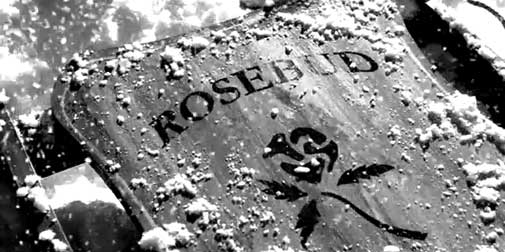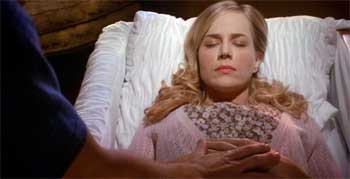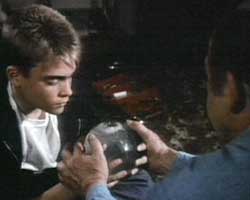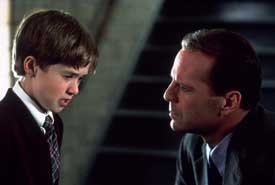
This is getting ridiculous, this "Spoiler Alert" hypersensitivity. Now that VCRs and DVRs and DVDs have given everyone the opportunity to watch what they want to watch when they want to watch it, now some of them want to be protected from their enjoyment being spoiled before they DO watch it. Within limits, that makes sense
But guess what, folks? There ARE limits...

On this site last week, I previewed the fifth-season premiere of Showtime's Dexter, discussing -- in the most general of terms, I thought -- why the new season was starting out as gripping as last year's, and that it picked up at precisely the same moment where last season's finale had ended: With Michael C. Hall's Dexter discovering the body of his wife, Julie Benz's Rita, the final victim of the serial murderer Dexter himself had just killed.
My complete column can be read HERE. And if you care to go back and read it, as Exhibit A, please take special note of how much detail I DIDN'T give -- and how I was more focused on conveying my opinion, and my excitement, than recounting any key plot points.
On this site, which clearly is read exclusively by the most discerning TV fans on the planet, no one complained. But when I previewed the same show last Friday for NPR's Fresh Air with Terry Gross -- which you can both read and hear HERE, in what I shall mark as Exhibit B -- some listeners blasted me for revealing too much. (For that matter, you read those comments in full as well.)
Now, Fresh Air listeners, too, are way up there on the discerning meter, but a few of their comments were so passionate and angry, I feel compelled to respond.

"You have completely ruined a fantastic series for hundreds of thousands of people," said one, upset that I had revealed that Rita had died the season before. "Many of us do not watch shows when they are broadcast," said another.
Okay. BUT... there have to be limits. There oughta be a law about when Spoiler Alerts become outdated, like groceries with use-by expiration dates. And I'm about to propose one.
The fourth-season finale episode of Dexter, the one I raised some ire by describing, was televised by Showtime last December. In 2009.
This is 2010. Not only that, but the fourth-season DVD set, which could be purchased and viewed by people who didn't even subscribe to Showtime, was released in August. It is now September. In four days, it will be October.
So how long, as a professional critic, am I supposed to wait before the pop-culture stragglers finally get around to the wanna-see stuff in their "To Do" piles? Do I have to wait until the slowest runner in the marathon crosses the finish line? And even then, what about Viewers: The Next Generation?
In the case of Dexter, I think -- and I assert, I argue, I insist -- that I'm completely within my rights, when a new season of a TV show begins, to discuss how the previous season ended. How else can it be placed into context? And if nine months isn't more than enough time to keep mum before "spoiling" something, then something's wrong. And not with me.

I'm not insensitive to wanting to preserve, for viewers, the same sense of surprise that I have when I watch something in advance. Monday night at 9 ET on NBC's The Event, for example, viewers who tune in will learn what happened to the plane, and its passengers, and where that all of that fits into the conpiracy-laden, flashback-obsessed plot of this complex new series.
I know already, because I've seen this week's episode (and next week's) -- but all you'll get out of me, for now, is that it isn't surprising, isn't impressive, and isn't worth the wait.

But that's NOW.
In 1988, when NBC's St. Elsewhere concluded with one of the most controversial finales in TV history -- the "snow globe" ending, in which the entire series was explained away as the meandering daydreams of an autistic kid -- critics such as myself were aware of the stunner, but didn't write about it in advance.
We did, however, write about it the next day, once it was broadcast, covering it as a news event worth discussing -- the same as we did for the boldly brilliant surprise ending of CBS's Newhart in 1990, which returned Bob Newhart to his previous TV bedroom, character, and spouse.
These days, technology has progressed so much that news value has, paradoxically, retreated. Decades ago, pre-VCR, no one thought of issuing Spoiler Alerts, because you either saw it or you didn't. But now, the sensitivity has gone the other way, and has gone way too far.
The picture at the top of this column is from one of the most famous movies ever made. If you know the film, you know what it is, and why the image is important. But if not, should there be a Spoiler Alert for a movie that was made more than half a century ago?

Should I keep quiet about what happens at the end of Moby-Dick -- the movie OR the book -- because some people haven't gotten around to it yet? Is it fair, yet, to commit to print any discussion of the twists in The Crying Game (20 years old next year) or The Sixth Sense (11 years and counting), or should we protect those secrets for those who have yet to experience them?
There has to be an end to the absurdity. My personal opinion is that once something has been broadcast, printed, exhibited or otherwise made available to the public, it's fair game. If I want to talk about the ending of Lost the day after it ended, I can, and will.
As for the issuance of Spoiler Alerts, I have my own sense of when to be sensitive -- and if you haven't gotten around to watching a show two months after it's come out on DVD, then, sorry, I don't have much sympathy for you. In fact, I don't have any. Once something is out there, if you don't want to know about it, then it's your responsibility to avoid discussion of it, not mine to avoid discussing it.
By the way, here's one last Spoiler Alert:
Ding-dong, the witch is dead. Which old witch?
You don't want to know.
Or do you?